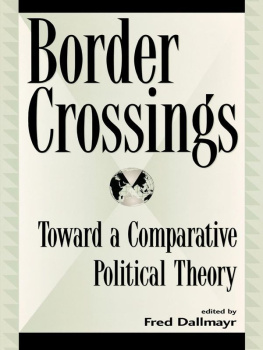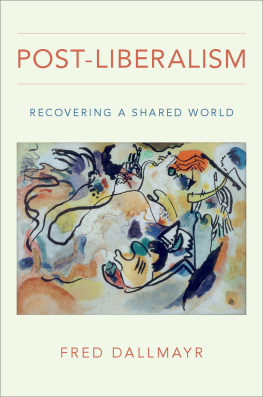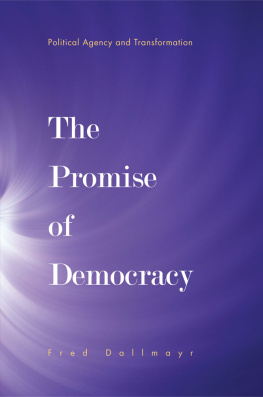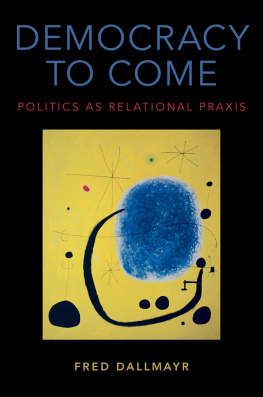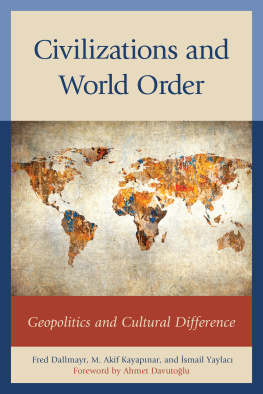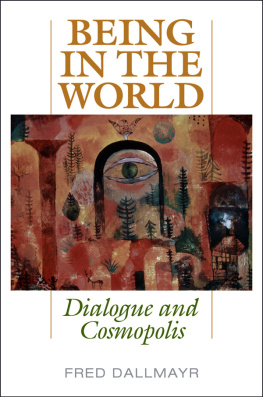Fred Dallmayr - Border Crossings: Toward a Comparative Political Theory
Here you can read online Fred Dallmayr - Border Crossings: Toward a Comparative Political Theory full text of the book (entire story) in english for free. Download pdf and epub, get meaning, cover and reviews about this ebook. year: 1999, publisher: Lexington Books, genre: Religion. Description of the work, (preface) as well as reviews are available. Best literature library LitArk.com created for fans of good reading and offers a wide selection of genres:
Romance novel
Science fiction
Adventure
Detective
Science
History
Home and family
Prose
Art
Politics
Computer
Non-fiction
Religion
Business
Children
Humor
Choose a favorite category and find really read worthwhile books. Enjoy immersion in the world of imagination, feel the emotions of the characters or learn something new for yourself, make an fascinating discovery.
- Book:Border Crossings: Toward a Comparative Political Theory
- Author:
- Publisher:Lexington Books
- Genre:
- Year:1999
- Rating:4 / 5
- Favourites:Add to favourites
- Your mark:
- 80
- 1
- 2
- 3
- 4
- 5
Border Crossings: Toward a Comparative Political Theory: summary, description and annotation
We offer to read an annotation, description, summary or preface (depends on what the author of the book "Border Crossings: Toward a Comparative Political Theory" wrote himself). If you haven't found the necessary information about the book — write in the comments, we will try to find it.
Border Crossings: Toward a Comparative Political Theory — read online for free the complete book (whole text) full work
Below is the text of the book, divided by pages. System saving the place of the last page read, allows you to conveniently read the book "Border Crossings: Toward a Comparative Political Theory" online for free, without having to search again every time where you left off. Put a bookmark, and you can go to the page where you finished reading at any time.
Font size:
Interval:
Bookmark:
Series Editor: Fred Dallmayr, University of Notre Dame
This series seeks to inaugurate a new field of inquiry and intellectual concern: that of comparative political theory as an inquiry proceeding not from the citadel of a global hegemony but through cross-cultural dialogue and critical interaction. By opening the discourse of political theorytoday largely dominated by American and European intellectualsto voices from across the global spectrum, we hope to contribute to a richer, multifaceted mode of theorizing as well as to a deeper, cross-cultural awareness of the requirements of global justice.
INTERNATIONAL ADVISORY BOARD
Shlomo Avineri, Hebrew University (Israel)
Gerhold K. Becker, Hong Kong Baptist University (China)
J. A. Camirelli, La Trobe University (Australia)
D. P. Chattopadhyaya, Centre for Studies in Civilisations, Delhi (India)
David Crocker, University of Maryland (United States)
Ahmet Davutoglu, Marmara University (Turkey)
Eliot Deutsch, University of Hawaii (United States)
Chaibong Hahm, Yonsei University, Seoul (Korea)
Paulin J. Hountondji, University of Benin (Benin)
Hwa Yol Jung, Moravian College (United States)
Raphael de Kadt, University of Natal (South Africa)
Hong-woo Kim, Seoul National University, Seoul (Korea)
Thomas Leithuser, University of Bremen (Germany)
Jitendra Mohanty, Temple University (United States)
Amena Mohsin, Dhaka University (Bangladesh)
Chandra Muzaffer, Just World Trust, Kuala Lumpur (Malaysia)
Ashis Nandy, Centre for the Study of Developing Societies, Delhi (India)
Kazuhiko Okuda, International University of Japan, Niigata
Thomas Pantham, M.S. University of Baroda (India)
Bhikhu Parekh, University of Hull (United Kingdom)
Chaiwat Satha-anand, Thammasat University, Bangkok (Thailand)
Abdulkarim Soroush, Academy of Philosophy, Tehran (Iran)
Jesse Freire de Souza, University of Brasilia (Brazil)
Charles Taylor, McGill University (Canada)
Tu Weiming, Harvard University (United States)
Border Crossings: Toward a Comparative Political Theory; edited by Fred Dallmayr
Forthcoming:
Gandhi and Self-Government, edited by Anthony J. Parel
Race, Ethnicity, and Reconciliation: A Multicultural and Comparative Dialogue, edited by Willuam E. Van Vugt

LEXINGTON BOOKS
Published in the United States of America
by Lexington Books
4720 Boston Way, Lanham, Maryland 20706
12 Hids Copse Road
Cumnor Hill, Oxford OX2 9JJ, England
Copyright 1999 by Lexington Books
All rights reserved. No part of this publication may be reproduced, stored in a retrieval system, or transmitted in any form or by any means, electronic, mechanical, photocopying, recording, or otherwise, without the prior permission of the publisher.
British Library Cataloguing in Publication Information Available
Library of Congress Cataloging-in-Publication Data
Dallmayr, Fred R. (Fred Reinhard), 1928-
Border crossings: toward a comparative political theory / Fred R. Dallmayr.
p. cm.(Global encounters)
Includes bibliographical references and index.
9780739152546
1. Political science. 2. Political sciencePhilosophy. 3. International relationsMethodology. 4. Comparative government. I. Title. II. Series.
JA66.D34 1999
320.5dc21
99-33088
CIP
Printed in the United States of America
 The paper used in this publication meets the minimum requirements of American National Standard for Information SciencesPermanence of Paper for Printed Library Materials, ANSI/NISO Z39.48-1992.
The paper used in this publication meets the minimum requirements of American National Standard for Information SciencesPermanence of Paper for Printed Library Materials, ANSI/NISO Z39.48-1992.
To all people seeking global justice and peace.
The editor wishes to thank Stephen M. Wrinn, editorial director of Lexington Books, for his willingness to endorse both the present volume and the new series, Global Encounters: Studies in Comparative Political Theory. Whereas most publishers are content to replicate established mainstream paradigms, Wrinn had the foresight and courage to support a new and relatively uncharted field of endeavor whose significance for the emerging cosmopolis is bound to be considerable. Thanks also go to Serena J. Leigh, the acquisitions editor for Lexington Books, and to the entire production staff, whose assistance was greatly appreciated. A special vote of thanks is due to Cheryl Reed, whose help in putting the entire manuscript into proper, camera-ready shape was invaluable.
The editor also expresses gratitude for a number of permissions to reprint. Chapters 1, 2, 5, 7, 8, and 10 are revised versions of essays which appeared in the Special Issue on Non-Western Political Thought of The Review of Politics, vol. 59 (Summer 1997), while chapter 9 appeared in The Review of Politics, vol. 60 (Fall 1997). The essays are published here with the permission of the general editor of The Review of Politics. Chapter 3 is a revised version of an essay first published in Case Western Reserve Journal of International Law, vol. 24 (1992); the essay appears here with the permission of the Journal. Chapter 6 was first published in the Journal of Peace Research, vol. 43 (1997), and is reprinted here with the permission of Sage Publications Ltd., London, UK.
Fred Dallmayr
The present volume seeks to inaugurate or help launch a new field of academic inquiry as well as of general intellectual concerns: the field of comparative political theory or philosophy. The impulse behind this initiative is a transformation which profoundly shapes our waning century and millennium: the emergence of (what some have called) the global village, involving the steadily intensifying interaction among previously more or less segregated civilizations or cultures. Carried forward by a seemingly inexorable momentum, this transformation is both exhilarating and deeply perplexing or frustrating. One of the sources of perplexity has to do with the prevailing babel of tonguesevident in the fact that the emerging global community is so far marked by noncommunication. To be sure, there is no shortage of information channels, but whatever channels exist tend to be either strategically tilted or narrowly monolingual or monocultural in character. Differently phrased: the prevalent global discourse is a discourse of the market and, to some extent, a discourse of science, technology, and the media. What is lacking is a discourse about deeper existential and practical-moral concerns: a discourse about the meaning structure of the global village, about proper modes of living and sharing together, or about what Aristotle called the good life. To this extent, our time is suffering from a global culture lag: a lag of human understanding behind the immensity of technological change.
In contemporary academia, comparative political theory or philosophy is either completely nonexistent or at best an embryonic and marginalized type of endeavor. As practiced in most Western universities, the study of political theory or philosophy involves basically the rehearsal of the canon of Western political thought from Plato to Marx or Nietzschewith occasional recent concessions to stands of feminism and multiculturalism as found in Western societies. Only rarely are practitioners of political thought willing (and professionally encouraged) to transgress the canon, and thereby the cultural boundaries of North America and Europe, in the direction of genuine comparative investigations. On the face of it, this assertion seems to be belied by the presence of a well-established subdiscipline in Western political science: the field of comparative politics; however, that field is not simply synonymous or congruent with political theorizing. As cultivated by mainstream practitioners, comparative politics is either empirical-descriptive in character or else governed by stylized or formal models of analysisapproaches which rarely question their own premises or assumptions. From the vantage of political theorizing, what is most dubious about these models or approaches is their unabashed derivation from key features of modern Western politics, including the structures of the secular nation-state with its accent on proceduralism, separated powers, and the bifurcation of public and private domains.
Font size:
Interval:
Bookmark:
Similar books «Border Crossings: Toward a Comparative Political Theory»
Look at similar books to Border Crossings: Toward a Comparative Political Theory. We have selected literature similar in name and meaning in the hope of providing readers with more options to find new, interesting, not yet read works.
Discussion, reviews of the book Border Crossings: Toward a Comparative Political Theory and just readers' own opinions. Leave your comments, write what you think about the work, its meaning or the main characters. Specify what exactly you liked and what you didn't like, and why you think so.

